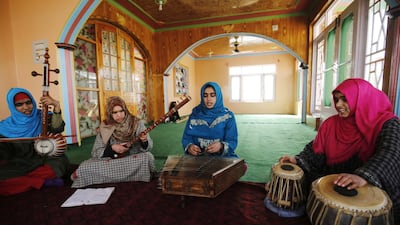When Kashmiri teenager Shabnam Bashir first took up classical Sufi music three years ago, she had to practise singing in secret because all the men in her Muslim family opposed her new passion.
Now the 14-year-old is a proud member of what her teacher Mohammad Yaqoob Sheikh says is the first mixed Sufi singing ensemble in Indian-administered Kashmir, where the music has for generations been a male preserve.
“It took me two months to convince them all,” says Bashir. “My father finally gave me permission on condition that it did not affect my regular studies.”
Thousands of people in the Muslim-majority region follow Sufism, a mystical branch of Islam, whose adherents seek spiritual communion through music and dance at the shrines of their saints. The songs, which use the lyrics of old Kashmiri, date back to the 15th century. But they have evolved as a uniquely male tradition, sung by men and handed down through the men of the family.
Sheikh is the exception – he learned the art from his maternal grandfather, Ghulam Mohammad Qaleenbaf, one of the region’s best-known Sufi singers.
“The earlier masters wouldn’t even pass it on to sons of their daughters – only sons or sons of sons,” Sheikh admits.
He began teaching young Kashmiris in a bid to preserve the Sufi musical tradition of the picturesque Himalayan region, which has been divided between India and Pakistan since partition. He said young Kashmiris were turning away from classical music and towards protest rap songs, inspired by the tense politics of the heavily militarised region.
“Teaching young boys and girls in a disciplined manner is the surest way to preserve this heritage,” says Sheikh, who adds that when he first started teaching girls, he faced opposition and had to move the classes to a new location four times.
“I wanted to do something to save Sufiyana,” he says. He has now trained nearly 50 Kashmiri women. Among his current students are teenagers Rehana Yousuf and her sister. Yousuf plays the Santoor, a 100-stringed instrument that accompanies Sufi singing.
“When I heard he [Sheikh] teaches girls too, I developed a strong urge to learn,” she adds. “My father is also his [Sheikh’s] student, and he was happy for me to come here.”
On the Pakistan side of the border, Sufi music is thriving thanks to a hybrid form known as Sufi Rock, in which the original lyrics are sung to electric guitar tracks and traditional tabla beats. But over the years, political tensions have eroded Indian Kashmir’s rich musical heritage.
Once a feature of most public events, performances of Sufi music are now relatively rare, but Sheikh still goes wherever there is demand. “Once in a while we go to perform in the homes of a few who still appreciate this music,” he notes.
* Agence France-Press

